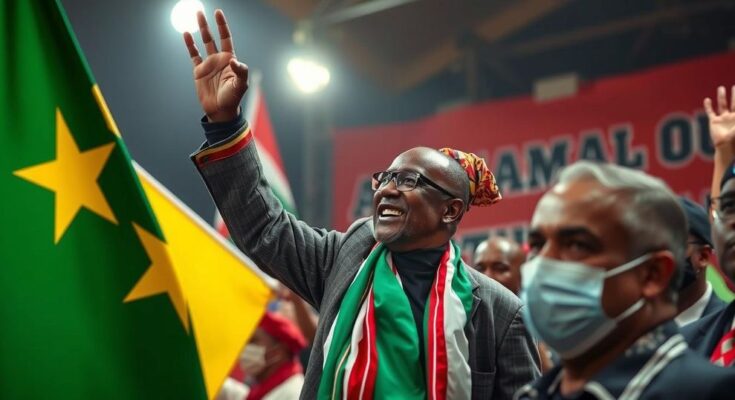Abdirahman Mohamed Abdullahi of the Waddani Party won Somaliland’s recent presidential election, receiving over 50% of votes. He aims to implement democratic reforms and address youth unemployment, succeeding Muse Bihi Abdi, who obtained around 30% of votes. The election faced multiple delays and comes amid Somaliland’s negotiations with Ethiopia, raising concerns among the opposition about economic benefits.
In a significant political shift in Somaliland, Abdirahman Mohamed Abdullahi, the leader of the opposition Waddani Party, has emerged victorious in the recent presidential election, securing over 50% of the votes cast, as confirmed by the electoral commission. This election marks a pivotal moment for Somaliland as it navigates its political landscape, having previously delayed elections due to funding issues. Mr. Abdullahi, aged 69, has a history in Somaliland’s political arena, having previously served as the parliament speaker in 2005. The Waddani Party’s campaign focused on advocating for democratic reforms, economic revitalization, and addressing youth unemployment, promising a fresh direction for the region’s governance. In stark contrast, incumbent President Muse Bihi Abdi of the ruling Kulmiye Party, who sought a second term after seven years in office, garnered approximately 30% of the votes. During his tenure, he focused on gaining international recognition for Somaliland, a region that declared independence from Somalia in 1991 amid civil unrest, yet has sustained a stable government and socio-economic structure despite lacking global recognition. The electoral process faced multiple delays since 2022 attributed to various challenges, including funding. Furthermore, Somaliland has recently engaged in negotiations with Ethiopia, granting it access to the Indian Ocean in exchange for political recognition, a move that has sparked tensions with Somalia. These developments have raised concerns among the opposition regarding the tangible benefits for Somaliland, particularly in trade. Mohamed Husein Gaas, director of the Raad Peace Research Institute, articulated these concerns, highlighting the lack of clear advantages for Somaliland from the Memorandum of Understanding. In the wake of recent election results, leaders within Somalia have expressed hopes for enhanced relations with the breakaway region. Former Prime Minister Hassan Ali Khaire expressed his optimism for a path toward unity and development under the new administration, while Djibouti’s President, Ismail Omar Guelleh, extended congratulations to Mr. Abdullahi on his electoral victory.
Somaliland, a self-declared independent region since 1991, has established its own governance and security infrastructure despite lacking international recognition. The region has cultivated a relatively stable political environment compared to the ongoing struggles faced by Somalia. Political dynamics in Somaliland have been shaped by negotiations with neighboring Ethiopia and internal calls for greater economic benefits and democratic reforms, reflecting the aspirations of its populace for improved governance and economic vitality. The recent presidential election further underscores these themes as the new leadership contends with the region’s aspirations amid broader geopolitical considerations.
The election of Abdirahman Mohamed Abdullahi as president signals a potential turning point for Somaliland, promising democratic reforms and economic revitalization. With calls for improved relations with Somalia and accountability in international agreements, the newly elected leader is tasked with navigating a complex political landscape. The hopes expressed by Somali leaders and neighbors highlight the significance of this election for regional unity and stability.
Original Source: www.seattletimes.com




